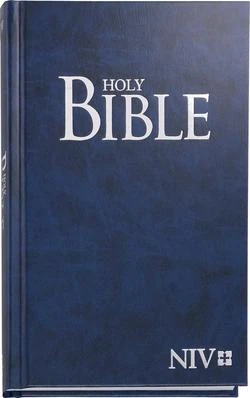| New International Version | |
|---|---|
| Full name: | New International Version |
| Abbreviation: | NIV |
| NT published: | 1973 |
| OT published: | 1978 |
| Complete Bible published: | 1978 |
| Textual Basis: | NT: Nestle-Aland Greek New Testament. OT: Biblia Hebraica Masoretic Hebrew Text, Dead Sea Scrolls, Samaritan Pentateuch, Aquila of Sinope, Symmachus the Ebionite and Theodotion, Latin Vulgate, Syriac Peshitta, Aramaic Targums, for Psalms Juxta Hebraica of Jerome. |
| Translation type: | Formal and dynamic equivalence |
| Reading Level: | 7.80 |
| Publisher: | Zondervan |
| Copyright status: | Copyright 1973, 1978, 1984, 2011 International Bible Society |
The New International Version (NIV) is an English translation of the Christian Bible and was the most popular of the modern translations of the Bible made in the twentieth century.
Translation[]
The New Testament was first published in 1973 and the complete Bible was published in 1978 and revised in 1984. The translation work was done under the auspices of the International Bible Society and Zondervan Publishing House.
The translation took more than ten years and involved 100 scholars from the USA, Canada, the United Kingdom, Australia, New Zealand, and South Africa. The range of theologians includes over 20 different Protestant denominations such as Baptist, Evangelicals, Methodists, Lutherans, and many more.
There has been some criticism of the NIV from conservative Protestants who objected to the non-literal method of the translation. The moderate use of the dynamic equivalence method of translation in the version involved a trade-off in which accuracy was sometimes sacrificed for the sake of readability. As Daniel Wallace of Dallas Theological Seminary observed, "Readability seems to have been a higher priority than anything else" in the making of the NIV. The erosion of accuracy was not as severe as in many modern versions which used this method of translation without restraint (e.g. the Good News Bible and the New Living Translation) but it did present problems for preachers and teachers who were trying to use the NIV while focusing on verbal details of the text. For instance, conservative teachers often like to point out that the word hilasterion (literally "propitiation") in the New Testament implies a certain doctrine of the atonement (God who is angry with sin must be made propitious toward us by the blood of Christ), but in the NIV this technical term was rendered rather loosely as "atoning sacrifice." And aside from such inconveniences to theological exposition, the idiomatic style seemed to make the sacred text less impressive and less memorable than most conservatives would prefer.
Similar criticisms have been raised by Catholics and Orthodox Christians, some of whom view the NIV as "too Protestant," or at least "too Evangelical."
Circulation[]
The translation has become the most popular modern English translation of the Bible, having sold 150 million copies worldwide. It is especially popular among American Evangelicals. It is considered by many Christians to be a good, modern supplement to more historic bible translations like the King James Version.
Study Bibles[]
- The NIV Study Bible (ISBN 0310929555)...an evangelical resource published by Zondervan, this was the first evangelical study Bible of the modern era and remains one of the most prominent
- Reflecting God Study Bible (ISBN 0310921317)...a Wesleyan revision of The NIV Study Bible published in the 1990s to remove perceived Calvinist biases
- Life Application Study Bible (ISBN 0842348921)...a "practical" lay study Bible focusing on spiritual formation rather than Biblical studies
External links[]
This article uses content from New International Version on Theopedia.
